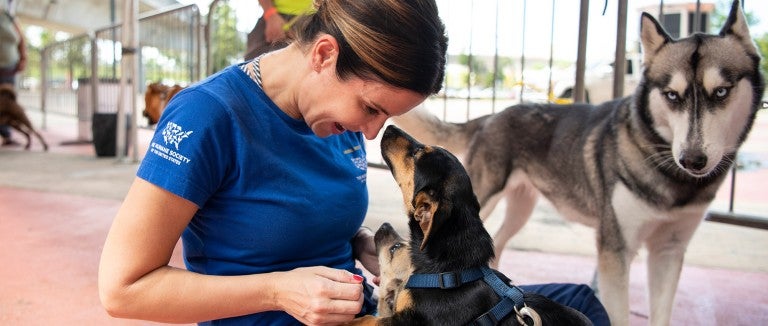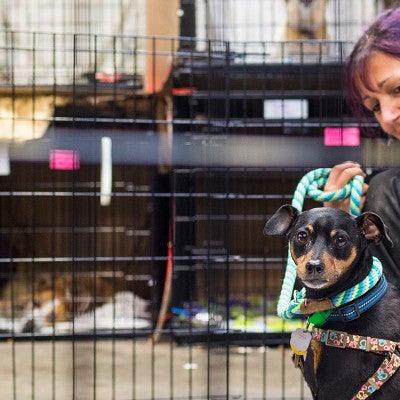The Humane Society of the United States was founded to tackle animal welfare challenges that were historically beyond the reach of local organizations, supplement the essential work of animal shelters and rescues by addressing the root causes of animal cruelty, advocate for stronger laws to ensure the protection of all animals and build innovative programs to support pets and their families.
Our programs work to help shelters reduce the need for euthanasia for healthy and adoptable pets, all while striving to identify and address the root causes of pet homelessness, such as a lack of pet-inclusive housing and access to affordable veterinary care. Our Pets for Life program and other initiatives are working to keep pets with their families, while our Stop Puppy Mills campaign works to end the sale of puppies from inhumane commercial breeding operations.
We celebrate the lifesaving work of local organizations and support their critical efforts in many ways:
-
We host Animal Care Expo, the preeminent annual conference and trade show for animal sheltering and rescue professionals and volunteers. Expo features professional development sessions led by experts in the field who provide skills and progressive strategies that can be applied by local organizations to benefit their communities globally.
-
We produce HumanePro, a free comprehensive online resource for animal shelter and rescue staff, advocates and volunteers. HumanePro provides stories, best practices, information on funding and grants, trainings, toolkits and how-to guides. These resources cover all aspects of shelter and rescue operations, including shelter design, disease control, shelter medicine, community programming, fundraising and adoption promotions, as well as animal welfare news, events, blogs and career advancement opportunities.
- One of our big fights is stopping puppy mills; we’re dedicated to ending the cruel treatment of dogs in mass breeding operations. The campaign helps shelters directly impacted by puppy mills in their communities by working with our Investigations department on undercover projects, as well as gathering complaints about puppy mills and sick puppies and directing them to the correct agencies in coordination with our Animal Rescue Team, which provides expert advice and assistance to local agencies on closing down puppy mills. The Stop Puppy Mills team advocates for better public policies to prevent puppy mills and improve standards of care for animals being bred for profit; it also conducts public awareness campaigns to encourage the community to consider pet adoption as their first option when choosing a dog. The team also manages the Puppy-Friendly Pet Stores program, which has more than 3,100 participating stores that have pledged to help shelter and rescue pets get adopted in their communities rather than offering commercially raised puppies for sale. The program has resulted in new homes for more than 35,000 shelter pets through pet store adoptions and events. The campaign’s educator toolkit, From Nose to Tail, is a free program for educators of elementary students; it teaches the values of humane pet care and humane pet acquisition, with an emphasis on shelter adoption.
Download An Advocate’s Guide to Stopping Puppy Mills
Download Puppy Mills and the Animal Welfare Act
- Cats continue to be a challenge for shelters across the country. Our Managing Community Cats: A Guide for Municipal Leaders and award-winning Return-to-Field Handbook are just two of the resources we have created to help shelters and the communities they serve to humanely reduce the unowned cat population. We work with the shelter and rescue community to improve laws for cats and to allow for lifesaving strategies such as trap-neuter-return best practices by local organizations. Rethinking the Cat symposia and a collection of webinars equip animal sheltering professionals and volunteers with tools and tactics to provide more lifesaving opportunities for cats in their care. The Humane Society of the United States is also a founding coalition member of the DC Cat Count, a research initiative which develops data-driven tools to enable shelters to increase their impact and effectiveness.
- We advocate for laws and policies that promote the human-animal bond and keeping pets and families together, many of which directly support the efforts of the entire sheltering and rescue field. We have developed various toolkits to help reform local animal ordinances, including prohibiting policies that unfairly target certain breeds of dogs. We promote policies for affordable and accessible pet-friendly housing and humane management of community cats—two major drivers of shelter intakes. We also tackle issues at the state level, including improving access to veterinary and behavioral care for pets, protecting lifesaving transport programs and ending the use of gas chambers for euthanasia.
Download Repealing Breed-Specific Legislation
Download Municipal Pet Policy Toolkit
Access Eviction Response Toolkit
- Our Shelter and Rescue Partner program is committed to collaborating with and assisting a national network of more than 400 animal shelters and rescues to drive advancements in the animal welfare field. Our partners assist with the rehabilitation and placement of animals rescued by our Animal Rescue Team from natural and man-made disasters. In addition, through our Shelter Mentorship program, we provide grant funding and mentorship to animal shelters that seek to improve their operations within several programmatic areas and policy issues, including community cats, pet-inclusive housing and regional capacity building to build local relationships with under-resourced shelters. Mentorships run an average of six months but vary based on organizational goals and capacity. Grant funds range from $10,000 to $25,000 based on the topic. Our long-term approach seeks to build local capacity through effective policies and programs that will, over time, reduce the number of animals flowing into animal shelters and keep more pets in their homes.
-
Our Animal Rescue Team provides on-the-scene support and expertise in the rescue and care of animals during disasters and large-scale situations of cruelty and neglect, such as animal fighting and puppy mill cases. We also offer training, expert guidance and much-needed resources to law enforcement and animal shelters throughout the country to assist with the investigation and prosecution of all animal crimes. In addition, we work with a network of Shelter and Rescue Partners across the country to ensure there is a safe place for the animal victims of these crises to recover.
-
Through tailored, hands-on and virtual trainings, we engage and empower shelter and rescue personnel—in addition to law enforcement officers, wildlife rehabilitators, veterinarians and clinic staff, government entities and the public—by providing humane resources, skills training, techniques and solutions to improve the quality of life of all animals.
-
Our free Adopters Welcome manual helps shelters and rescues build stronger relationships with their communities by removing adoption barriers and becoming more inclusive of all community members. The manual includes research, strategies and practical tools for immediate implementation of this conversation-based adoption program.
- Our Pets for Life program is guided by the philosophy that a deep connection with pets transcends socioeconomics, race, ethnicity and geography, and that no one should be denied the opportunity to experience the benefits, joy and comfort that come from the human-animal bond. Through door-to-door community outreach, Pets for Life provides veterinary care, supplies, services and information at no cost to pet owners, building trust, positive relationships and community partnerships. In pursuit of its goal to make companion animal welfare more just, inclusive and fair, Pets for Life delivers in-depth guidance and support to local organizations throughout the U.S. and Canada and to the veterinary profession, ensuring all have the necessary tools and knowledge to implement and sustain community outreach programming. In addition, Pets for Life encourages agencies tasked with enforcement of animal welfare ordinances and statutes to take a less punitive and more support-based approach, and for animal welfare organizations to enact policies that are equitable for all pet owners.
Download Pets for Life Tools and Guides
-
Advising pet owners on cat behavior issues can mean the difference between a cat keeping or losing their home. Our Guide to Cat Behavior Counseling was developed to help sheltering professionals learn how to appropriately advise pet owners on cat behavior issues to keep them in their existing homes.
-
Through our Humane Society Veterinary Medical Association, we offer resources and support to veterinary professionals who are working for or volunteering with shelters and rescue groups or who are facilitating access to veterinary care in their private practices. That support includes a wide range of continuing education programs on shelter medicine, community care and other animal welfare-related topics available via the HSVMA online webinar series as well as the Speaker’s Bureau presentations at veterinary schools. HSVMA also provides free resources on cat declawing, wildlife care, spay/neuter and other veterinary-related topics and discounts on textbooks and various veterinary services to those working in the field. Finally, HSVMA plays a key role in advocating for legislative and regulatory initiatives that benefit veterinary professionals working in shelters and with rescue groups, including expanding access to telemedicine, allowing continuing education credits for community service and enacting other incentives for providing access to veterinary care.

